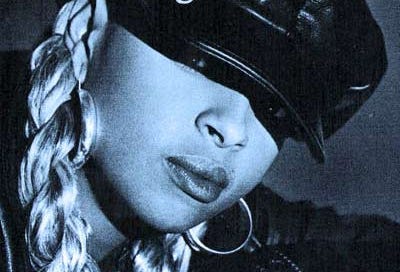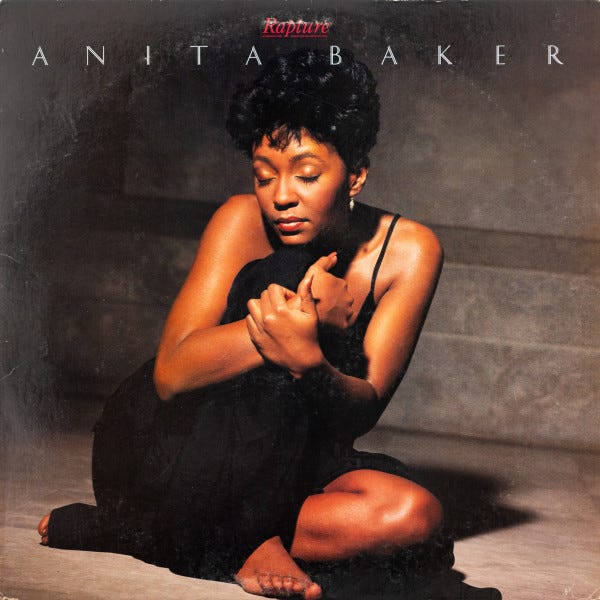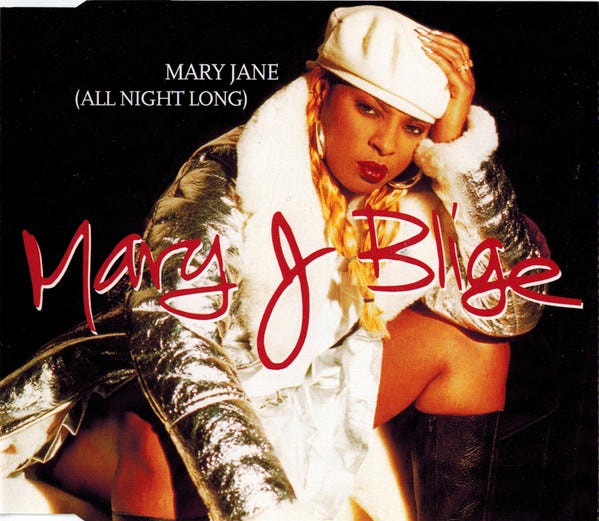86. Mary J. Blige - My Life (Uptown/MCA, 1994)
Mary J. Blige is royalty, specifically “The Queen of Hip-Hop Soul”. As with all royalty, conferred titles are made up and generally bestowed by people who are acting like royals themselves, in this case Sean Combs, a rapper who certainly acts like a royal, in ways most other rappers don't, and who gave Mary her title before her debut album was even out. What then of the kingdom? “Hip-hop soul” is similarly a made-up-by-Diddy domain. If you could call it a genre it would probably consist of soul vocals on rap-inspired beats, post-dating new jack swing and predating Erykah Badu. It has no attributes of its own, and identifying it is more a process of looking the year up. It is a market movement, of hip hop encroaching on R'n'B and R'n'B encroaching on hip hop, creating synergy at the peak of record industry pomp.
Strange things happen when you are royalty. Kamala Harris and Saddam Hussein are noted fans of Mary's, isn't that weird? My research on Blige started with reading an interview with her in Harpers Bazaar in support of an upcoming documentary about her and her most famed album, My Life. It seems that some topics are off limits in this interview. This includes the topic of music, which neither interviewer nor subject really discuss at all. I've seen softball interviews before, but this has to be a little unusual, even for a fashion magazine. Royal privilege.
Then there is royal misery. The unrelatability of an unusual life. The perpetual presence of isolation, temptation and neuroses. I won't write much detail on this, but Mary is a textbook example of how not to raise a healthy human being. She has experienced poverty, deprivation and neglect at a crucial age, and My Life, better than any other album is an illustration of the consequences of this. At the time of My Life, Mary was one half of a power couple with K-Ci, who is one half of K-Ci and Jojo and one quarter of Jodeci. Their relationship lasted twelve years, and My Life was recorded in the second and third years.
On an average R'n'B or soul record, there are colours that you expect the artist to paint with. Tried and tested song archetypes of life, love and emotion. My Life doesn't do this, it's a monochrome.
Mary Jane Blige was discovered when a cassette of her singing “Caught Up In The Rapture” by Anita Baker in a mall karaoke booth went from her mother to an A&R man for Uptown Records. Uptown had built its name on testosterone: Heavy D and the Boys, Ultramagnetic MCs, Guy (a guy called “Guy”). Mary was invited to join the rabble. Her debut What's the 411? has three and a half minutes of answer phone messages from horned-up fellas at the start, including Sean Combs, Dr Jekyll, C.L Smooth, Christopher Williams, Clark Kent, Maceo and Little Shawn before we hear her sing. As if that's not enough territory marking, Busta Rhymes shows up in the middle of the album and all but takes a leak in the corner, rapping just one bar across a two minute tirade, ensuring a parental advisory sticker. I'm normally happy to hear him, but “Intro Talk” is an extremely fucked-up track. The label wanted to repeat this on the second album, putting Notorious B.I.G on My Life, a verse including the phrase “The lyrical molestin' is takin' place / fuckin' with B.I.G. it ain't safe” (those lyrics appear farther up the Apple list), but they were concerned, not that it was in poor taste, but about the parental advisory sticker. Must be the only time Sean Combs ever removed Biggie from anything.
When Mary is permitted to sing we hear that she has a great voice, kind of like Mariah Carey's hypothetical protective big sis. Like Mariah there's a big seventies soul influence and a tendency to drift into flights of pure melodic fantasy. I think back to that Anita Baker record, “Caught Up In The Rapture”, what an image that cover must have been to women seeking solace in soul.
The songs on What's The 411? are reportedly all male-penned, except one Chaka Khan cover. I'm not sure I believe this as the lyrics are often hinting towards the voice of My Life. When this debut blew up, it was remixed entirely by men, including Teddy Riley (King of New Jack Swing), Daddy-O and “Buttnaked” Tim Dawg and rereleased.
Somewhere along the way, Mary is somehow able to assert herself into getting to write her next album. We know in hindsight that Mary is not at all well by this point. The protagonist of this album, an album which is called My Life, isn't well either.
On “Mary Jane”, the rhythm is a kind of pleasant affair. Big strong DMX (the machine, not the man) drums, but happy flutes and harps. The song concerns someone who wants her man to come over for some loving (“All the things you want to do / Just relax and I'll take care of you / And anytime you want me / I'm saying that I love you everyday”). However, there's trouble from the get go and we can hear that this is someone trying to reset a troubled relationship (“Ooh baby, not tonight / I don't wanna fuss and fight / I just wanna make it right”, “And I know that you love me, baby admit it”, “You know that I know that you love me / So, if you just give me a chance / I can still show you romance / I know that you're still savoring for my flavour, babe / So, stop playing hard to get / Let's make love like we first met”). There are no real metaphors at work here, just a plain declaration of intent. As a song, it would be quite effective by itself. Thing is, we're about to hear this same song again and again and again in different forms. Every song has longing, sexual submission, an admission of flaws in the history of the relationship and an inability to cope with the partner's absence. Here's a snatch from the next three tracks:
“Oh, oh boy I'll be your toy / Come on and play with me / And never leave me”
“You know that I / You know that I want to be with you / I just want to be with you”
“If you wanna be happy (You know I'm gonna do things) / I'm the only one you need (Do things, do things) / All you have to do is trust me (Good things, bad things wit'cha) / You'll never have to be sad again / 'Cause I'll always be your friend”
One rapper does sneak on the record, Keith Murray, for some irrelevance (“Ayo, catch this wordage bubonic plague / In your head, back, chest, arms, and legs / When I'm coming through, grab your cranium for alternatum, son”). Then we get the title track. “My Life” has a very G-funk feel in spite of being East Coast thanks to the Roy Ayers sample. It's a blurred window into a past and present of trauma, (“If you looked at my life / And see what I've seen / (Down and out, crying every day, don't know what to do or to say)”), interspersed with sunshine and God's love, and even some therapeutic insights into the total picture of what is going on, but even still there is further descent into obsession on this relationship. Every song is being hijacked by compulsion, the “come on over” song, the “night out with the ladies” song, and now the “my life has been hard, but God is getting me through it and I'm learning about myself” song. On and on it goes, but what should be monotonous is actually really unique and increasingly heartbreaking in its effect. We've had titles like “Mary Jane” and “My Life” and we get to “Mary's Joint”, which absolutely is not “Mary's Joint” at all because she is still convinced that she is not herself without her man.
On “No One Else”, K-Ci, the man himself, shows up to proudly survey what he has done to his woman. Surely at last they will be happy, together, forever. “Be Happy” is a fitting final track, because it goes the other way. Mary is at least looking for some agency of her own and sings “I just wanna be so, so, happy / But the answer lies in me / I do believe”. It's no resolution at all however. As late as the final verse, Mary sings “Life is too short to be tryin' to play some games / Now take some time and think about / If it's really worth losing me / Why must it be this way? / Why do you have to play with my mind / All the time?”. Though it floats on the joyousness of Curtis Mayfield, Barry White, Teddy Pendergrass, Rose Royce (Mary covers “I'm Going Down”, a definite highlight), My Life is ultimately a tragedy.
Did It Make Much Of A Splash?
New Jack Swing was not long for the world. Vanilla Ice-type dancing to songs that start with a highly swung “Shave And A Haircut” snare and a bass slide was never built to last. Swingin' MIDI was being replaced by punched in samples, dull, crinkly, cushioned R’n’B. Mary was a natural on this stuff and showed a lot of singers a way forward. Furthermore, the tragedy in her music was deeply felt by audiences whose obsessions it articulated so thoroughly. Though Mary’s feelings ultimately did not resolve (they continue throughout her work), just speaking them was enough to make a huge difference to many people who could hear it.
Where To Go From Here?
For one, I recommend this Wikipedia article about honorifics in music. It's nice to see The Queen of Hip Hop Soul, the Godfather of Soul, the King of Pop and, er, the Emperor of Anime Songs all in one place.
For some more Mary, check out “Family Affair”, it's a definite change of pace from My Life and was a monster hit. There's “Not Lookin”, a K-Ci duet which makes a melodrama of their twisted relationship. “As” with George Michael works well (she can sing Stevie too, I guess). She's great on “I'll Be There for You/You're All I Need to Get By”, with Method Man, and the utterly bleak “No More Drama”, whose video likely influenced Darren Aronofsky on Requiem for a Dream.






